Travel Cybersecurity Guide: Avoid Scams and Stay Protected on the Go

Whether you're heading out on a weekend getaway, a business trip, or an extended vacation, protecting your personal and professional data while traveling is critical. From checking emails at the airport to logging into hotel Wi-Fi, your digital footprint can be exposed in unexpected ways. Jonathan Stiffler, Baker Boyer’s cybersecurity expert, shares essential tips to help you stay secure before, during, and after your travels.
Before You Go: Set Up a Strong Defense
- Update Devices and Apps
Think of software updates as sunscreen for your data, they protect you from known vulnerabilities. Before you pack your bags, make sure all your devices and apps are fully updated with the latest security patches. - Encrypt Your Devices
Losing a phone or laptop while traveling is stressful, but if your device is encrypted, your personal information remains protected. It’s like locking your suitcase with a digital padlock. - Strengthen Your Passwords
Summer is no time to slack on password hygiene. Use strong, unique passwords for each account and turn on multi-factor authentication (MFA). MFA acts as a second lock on your digital hotel room, giving you extra protection. - Back Up Your Data
Before hitting the road, back up your devices to the cloud or an external drive. If your device is lost or compromised, you’ll still have access to your vacation memories and important work files. - Travel Light Digitally
Only bring the devices and data you need. The less you carry, the less you risk losing.
While You're Traveling: Stay Vigilant
- Be Wary of Public Wi-Fi
Free Wi-Fi may be convenient, but it’s also a hotspot for cybercriminals. Avoid using public networks if possible, and always use a VPN to encrypt your connection when you must connect. - Turn Off Auto-Connect
Disable Bluetooth and Wi-Fi auto-connect features. These can unwittingly connect your device to rogue networks or devices, exposing you to attacks. - Avoid “Juice Jacking”
Public USB charging stations can be used to steal data or install malware, a tactic known as juice jacking. Use your own charger and plug directly into a power outlet instead of USB ports.
Watch for Scams: Phishing & Social Engineering
- Be Extra Alert to Phishing
Travelers tend to let their guard down, making them easier targets for phishing emails, text scams (smishing), and even phone scams (vishing). Be cautious with any unexpected communications requesting personal information. - Spot the Signs of a Scam
Watch out for:
-
-
-
- Urgent or threatening messages
- Misspelled email addresses or URLs
- Unfamiliar links or attachments
- Requests for personal or financial data
- Hover over links before clicking, and always verify the sender through a known contact method.
-
-
Whether you're traveling across the country or checking in from a local coffee shop, a few simple precautions can help protect your data and keep your travels stress-free. If you have any concerns or suspect any fraudulent activities related to your Baker Boyer accounts, please do not hesitate to reach out to us at (509) 525-2000 or (800) 234-7923.
Visit our fraud resource page to learn more about how you can protect yourself against fraud.


